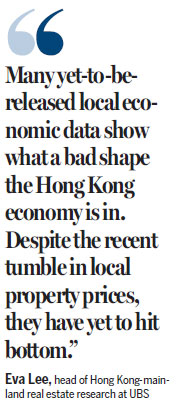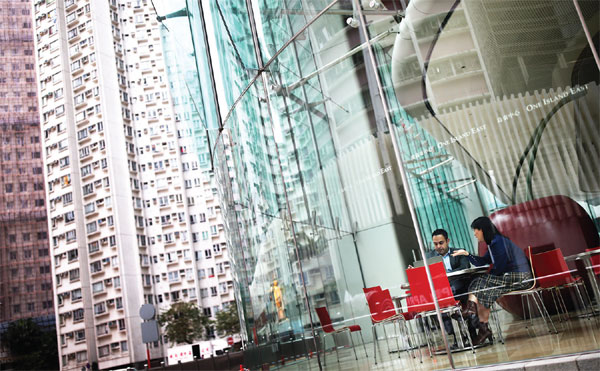Homes market 'yet to hit bottom'
Updated: 2016-03-31 07:37
By Oswald Chan in Hong Kong(HK Edition)
|
|||||||
|
Hong Kong's real estate analysts agree that local homes prices will continue to be on a downward trend, but have ruled out a crash. Edmond Tang / China Daily |
UBS sees HK property prices falling over next two years on rising supply, weak economy
Hong Kong may have seen its real estate prices slump recently from last September's peak levels, but it's not the end of the story.
Global investment bank UBS has come up with a more bearish view, arguing that local homes prices have yet to hit bottom, and projecting a further 25-percent price fall over the next two years on the back of increased housing supply and a subdued world economy.
In its latest research report on the SAR's property sector, the Swiss bank forecasts that prices will slip another 15 percent this year and 10 percent in 2017.
It drew attention to the fact that with Hong Kong's homes supply reaching a 10-year high, the market will come under pressure.
According to UBS, 87,000 residential units had been completed by the end of 2015 - 33 percent higher than the average of 65,600 units registered between 2004 and 2014.
Under the government's 2016-17 land sales program, 29 residential sites, including 14 new ones, that can provide a total of about 19,000 units, will be up for grabs. The government is confident that the number of private residential apartments to be completed in the 2015-2016 fiscal year will exceed 20,000.
"Besides rising supply, the expected poor performance of the Hong Kong economy will also depress local homes prices," Eva Lee, head of Hong Kong-mainland real estate research at UBS, said on Wednesday.
"Many yet-to-be-released local economic data show what a bad shape the Hong Kong economy is in. Despite the recent tumble in local property prices, they have yet to hit bottom," she warned.

"Local homes prices have already retreated 13 percent from their peak levels in September last year. And, tightening measures for the sector have led to secondary homes transactions being halved despite price increases over the past three years."
The UBS report notes that secondary homes transactions in the SAR had dived to an average of 39,000 units annually between 2013 and 2015, representing a 57-percent decrease, compared with the average of 90,600 units per annum recorded between 2005 and 2012.
A raft of measures imposed by the government in 2010 to curb speculation in the property market has remained in place, including levying various stamp duties and tightening the down payment ratio for mortgage loans.
Real estate analysts agree that local homes prices will continue to be on a downward trend, but have ruled out a crash.
US-based Colliers International expects mass residential homes prices to experience a soft decline of 10 percent for the whole of this year.
It argued that there are no signs of construction costs coming down, with long-term demand still outweighing supply and a further hike in interest rates seemingly deferred for the time being.
"The first-hand market will remain the focus of Hong Kong's residential sector as developers will continue to offer initiatives and financial plans to attract buyers, while overall transactions will remain low," a DTZ/Cushman & Wakefield report said.
"The slower rate of growth in homes prices is attributable to rising supply, as well as volatility in the mainland's financial markets and expectations of rising interest rates," noted Kate Everett-Allen, a property analyst at UK-based real estate advisory firm Knight Frank.
According to Knight Frank, Hong Kong's property prices surged 7 percent in 2015 although the city recorded a quarterly loss of 3.7 percent in prices in the fourth quarter of last year, compared with the previous quarter.
oswald@chinadailyhk.com
(HK Edition 03/31/2016 page9)
